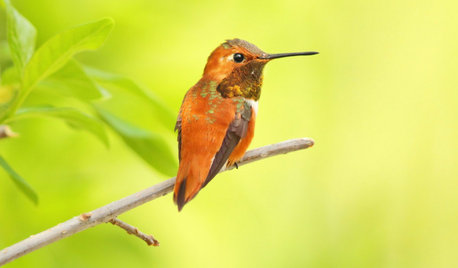Please explain something about GMO, RoundUp etc to this lurker.
lurkandkibitz
13 years ago
Related Stories

GARDENING GUIDESNew Ways to Think About All That Mulch in the Garden
Before you go making a mountain out of a mulch hill, learn the facts about what your plants and soil really want
Full Story
EDIBLE GARDENSNatural Ways to Get Rid of Weeds in Your Garden
Use these techniques to help prevent the spread of weeds and to learn about your soil
Full Story
GARDENING FOR BUTTERFLIESGardening for the Bees, and Why It’s a Good Thing
When you discover how hard bees work for our food supply, you may never garden without them in mind again
Full Story
MOST POPULAR11 Nominees for the ‘She Shed’ Hall of Fame
These special sanctuaries let busy women get away from it all without leaving the backyard
Full Story
EXTERIORSWhere Front Yards Collide: Property Lines in Pictures
Some could be twins; others channel the Odd Couple. You may never look at property boundaries the same way again
Full Story
DECORATING GUIDESThe Hottest Houzz Discussion Topics of 2012
Discussions rocked and rolled this year with advice, support, budding friendships — and oh, yes, a political opinion or two
Full Story
GARDENING GUIDESBackyard Birds: Invite Entertaining Hummingbirds Into Your Garden
Hummingbirds — unique to the Americas — zip through open landscapes seasonally or year-round. Here’s how to attract them
Full Story
HEALTHY HOME12 Ways to Set Up Your Kitchen for Healthy Eating
Making smart food choices is easier when your kitchen is part of your support team
Full Story
LANDSCAPE DESIGNSmall Garden? You Can Still Do Bamboo
Forget luck. Having bamboo that thrives on a wee plot just takes planning, picking the right variety, and keeping runners in check
Full Story
LANDSCAPE DESIGN15 Great Ideas for a Lawn-Free Yard
End the turf war for good with hardscaping, native grasses and ground covers that save water and are easier to maintain
Full Story



shebear
Lloyd
Related Discussions
Hosta Virus X and Round up
Q
Do I Use RoundUp First on the HVX's?
Q
GMO Monsanto
Q
soybean meal and Round-Up
Q
organicdan
Lloyd
Kimmsr
borderbarb
Lloyd
peter_6
sandhill_farms
gtippitt
Kimmsr
organicdan
Lloyd
Dan _Staley (5b Sunset 2B AHS 7)
sandhill_farms
Dan _Staley (5b Sunset 2B AHS 7)
gtippitt
organicdan
Lloyd
Kimmsr
henry_kuska
Lloyd
henry_kuska
Dan _Staley (5b Sunset 2B AHS 7)
henry_kuska
pnbrown
henry_kuska
Lloyd
henry_kuska
ga_karen
henry_kuska
Lloyd
carolb_w_fl_coastal_9b
Lloyd
gargwarb
henry_kuska
henry_kuska
henry_kuska
henry_kuska
henry_kuska
carolb_w_fl_coastal_9b
gargwarb
Lloyd
dicot
Dan _Staley (5b Sunset 2B AHS 7)
scarletdaisies
scarletdaisies
organicdan
DownBabylon
pnbrown